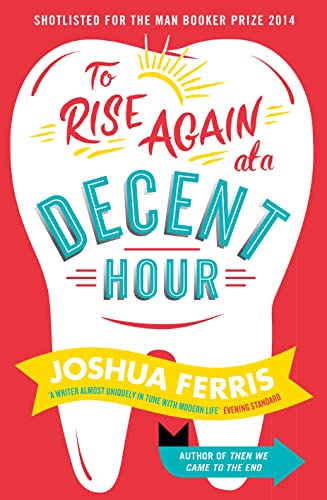Joshua Ferris's dazzling new novel To Rise Again at a Decent Hour is about the meaning of life, the certainty of death, and the importance of good oral hygiene.
There's nothing like a dental chair to remind a man that he's alone in the world'
Paul O'Rourke, 40 year-old slightly curmudgeonly dentist, runs a thriving practice in New York. Yet he is discovering he needs more in his life than a steady income and the perfect mochaccino. But what?
As Paul tries to work out the meaning of life, a Facebook page and Twitter account appear in his name. What's at first an outrageous violation of privacy soon becomes something more frightening: the possibility that the online "Paul" might be a better version of the man in the flesh. Who is doing this and will it cost Paul his sanity?
'Slick, sophisticated and very funny . . . has modern Everyman fighting for his identity in an increasingly impersonal world' Daily Mail (on Then We Came to the End)
'Brilliant, funny, stomach-turningly accurate' Observer (on Then We Came to the End)
'He has teased ordinary circumstances into something extraordinary, which is exactly what we want our fiction writers to do' Economist (on The Unnamed)
Joshua Ferris was born in Illinois in 1974. He is the author of Then We Came to the End (2007), which was nominated for the National Book Award and longlisted for the Guardian First Book Award, and The Unnamed. In 2010 he was selected for the New Yorker's prestigious '20 under 40' list. He lives in upstate New York.
An Amazon Best Book of the Month, May 2014: Paul O'Rourke defines himself as three things: a dentist, a die-hard Red Sox fan, and an atheist. He's also a bit of a jerk, which is why, when someone sets up a fake website for his dental practice, Paul has trouble figuring out who is responsible. But a synopsis of To Rise Again at a Decent Hour can hardly do justice to a novel that is constantly changing shape and context. What begins as a stirring questioning of personal identity later evolves into a poignant meditation on the value of community, before transforming again into something entirely different. As with his previous novels, Then We Came to the End and The Unnamed, the paths of Joshua Ferris's narrative intentions are windy and at times unclear. But patient readers will find that when the author pulls the story from out of the woods, the things Ferris has to say about humanity are curiously and devastatingly observed. ---Kevin Nguyen
